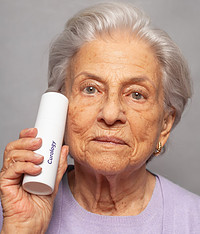
Following my article on aging and biological age, I want to share some findings that, although they may seem obvious, they are not so obvious, and we will see why. The wrinkles you see on your face and body are more than a sign of old age and wisdom. It may surprise you to learn that your wrinkles may be signs that something is wrong with your body, especially with your heart and cardiovascular system.
What Are Researchers Saying?
The European Society of Cardiology revealed the results of a study carried out in France, which concluded that people who have lots of deep forehead wrinkles, more than is typical for their age, may have a higher risk of dying of cardiovascular disease (CVD). One of the study authors said that you could not see or feel high cholesterol levels or, in many cases, asymptomatic hypertension, but wrinkles can be seen and measured. Then they could conduct the appropriate studies and provide recommendations to reduce the risk. I wonder if it also includes removing forehead wrinkles.
According to the study authors, this was not the first investigation to explore visible signs that could predict cardiovascular disease. For example, the famous rooster Paticas that usually appear in the eyes’ corners showed no relationship. These wrinkles result from the movement patterns of the face.
Scientists mentioned other signs, such as baldness in men, earlobe folds, and bags of cholesterol under the skin that appeared related to the disease. None of these signs increased the risk of death.
Researchers do not yet know the reason for the relationship, which persisted even when factors such as job strain, and of course, age and gender were taken into account. They speculate that it could have to do with atherosclerosis or hardening of the arteries due to plaque buildup. Atherosclerosis is a major contributing factor to heart attacks and other cardiovascular events.
Either way, the scientists managed to give a coherent explanation of their findings. They found that changes in collagen protein and oxidative stress appear to influence both atherosclerosis and wrinkles. Also, the forehead’s blood vessels are so small they can be more sensitive to plaque buildup, which means that wrinkles may be among the first signs of aging vessels.
This means that people with oxidative stress are more likely to have wrinkles and poor heart health. Although not everyone with additional wrinkles should worry about their heart, it is important to get regular checkups.
More About Deep Forehead Wrinkles
Certainly, common sense and life experience suggest that deep wrinkles on the forehead reflect lifestyle factors (age, unhealthy diet, stress, etc.), leading to increased cardiovascular risk.
There are also many other reasons why you may have wrinkles, and of course, ways to prevent them from deepening. This reminds me of another interesting study on corpses of youth and adults. This found that the decrease in the density of the retinacula cutis (a fibrous band that connects the superficial layer of the skin with the layer that separates it from internal structures) in areas with wrinkles seems to be one of the factors that make them deeper.
What To Do About It?
The first thing that comes to mind is that if you have more wrinkles on your forehead than you normally should at your age, you should go to the doctor and check your cardiovascular health. Other actions include: Pay attention to your body and watch for any changes. Eat a healthy diet. Exercise is another important factor in avoiding heart disease. Knowing the signs and symptoms of a heart attack and stroke is critical. You want to be prepared if you or a loved one begins to suffer these problems. Consider excessive stress and try to eliminate stressors from your daily life.
Tips By Age.
If you are between 20 and 30 years old …
Stop using retinol immediately if you are (once you get to too high a percentage, it’s tough to go back) and take a look at your surroundings. Are you using sunscreen? Hydrating enough? Exfoliate once a week? How is your life? External and internal stress can cause damaging “bumps” on the skin. That’s it, from the pressures of that new job interview to metropolitan pollution that is wreaking havoc on your skin in the form of acne or minor wrinkles.
Keep calm and go ahead! Add stress relievers to your routine. Try daily morning meditations, posture exercises (stress can change the way you carry your body), and change your diet. Try making homemade tonics to get your spirits back and checking out this simplified skincare routine.
Again, if you are using retinol, stop it while you can. Instead, consider a light chemical exfoliation with face acids. Dead skin cells can build up and darken the appearance of wrinkles. You may also want to invest in some vitamin C serums if you haven’t yet.
Of course, skin approaching its 40s can be significantly less hydratedTrusted Source. So, on top of exfoliation, be sure to moisturize with a night cream and drink plenty of water every day for the rest of your life. Both work in the effort to pop elasticity back into your skin and reduce wrinkles.
Try this: Aim to drink eight glasses of pure water per day. After sunscreen, hydration is the next most important step to letting your skin achieve that crème-de-la-crème texture.
As for face acids, some, such as lactic acid, can provide moisturizing effects. Or make sure to buy products that contain hyaluronic acid.
The 40s to 50s and beyond
This is the time that you should seek the advice of an esthetician in conjunction with your dermatologist. Chances are now if it’s time to check out that gold standard retinoid you’ve heard about (start with very little!), especially if you’ve completed the checklist to address your mental health and skin health. Another factor to consider is a change in your environment or lifestyle. Has the weather changed? Is your office ventilation questionable? Do you travel more by plane? The skin between 40 and 50 years old can be significantly less hydrated and produce less sebum, which means it will be more reactive to environmental changes and stress.
Between the ages of 40 and 50, most people actually feel that hormonal change physically affects their bodies. You may notice weight gain or limited flexibility. Your 50s is also the time to re-evaluate your diet and exercise habits, as your risk of cardiovascular disease increases as well. Try this: sit back, take a breath, and see any changes you can make to support your body. Consider eating more antioxidant foods (or follow Dr. Gala WeightTensive Ketogenic). Invest in a heavy-duty moisturizer and travel-size rosewater spray. I also recommend doing dermarolling to increase collagen production. If you are still not seeing changes, and want to dig deeper, ask your esthetician about laser treatments like Fraxel.
Conclusion
While the number of wrinkles can make others think you are an older reliable source, note that there is no reason to remove them unless you want to do it. After all, science says the older you are, the happier you’ll probably be too.








I have read a few posts on your website and can I just say, this is one of the best websites I have ever come across. It is very neat and well presented. I am still young in age so I do not think I will experience these problems for a long time to come, but its always good to learn something new.
Thank you for your feedback, Daniel! It’s always our goal to provide the best information possible, and we’re happy that we were able to teach you something new.